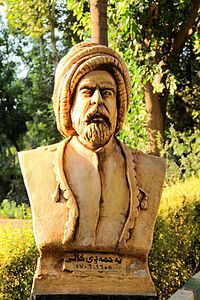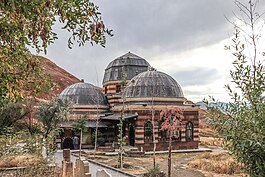| Revision as of 14:29, 15 June 2021 editRodw (talk | contribs)Autopatrolled, Event coordinators, Extended confirmed users, New page reviewers, Pending changes reviewers, Rollbackers772,211 editsm Disambiguating links to Beyazid (link changed to Doğubeyazıt) using DisamAssist.← Previous edit | Latest revision as of 16:33, 26 December 2024 edit undoIlamxan (talk | contribs)Extended confirmed users7,394 editsNo edit summaryTags: Visual edit Mobile edit Mobile web edit Advanced mobile edit | ||
| (35 intermediate revisions by 23 users not shown) | |||
| Line 1: | Line 1: | ||
| {{Short description|Kurdish intellectual |
{{Short description|Kurdish intellectual and nationalist (1650–1707)}} | ||
| {{for|the village in Iran|Ahmad Khani, Iran}} | {{Not to be confused with|Ehmedê Xasî}}{{for|the village in Iran|Ahmad Khani, Iran}} | ||
| {{Use dmy dates|date=April 2020}} | {{Use dmy dates|date=April 2020}} | ||
| {{Infobox academic <!-- for more information see ] --> | {{Infobox academic <!-- for more information see ] --> | ||
| | name = |
| name = Ehmedê Xanî<Br> ئەحمەدێ خانی | ||
| | image =Statue_of_Kurdish_poet_and_writer_Ahmadi_Xani_in_Sulaymaniyah,_Kurdistan,_Iraq.JPG | | image =Statue_of_Kurdish_poet_and_writer_Ahmadi_Xani_in_Sulaymaniyah,_Kurdistan,_Iraq.JPG | ||
| | imagesize = 200px | | imagesize = 200px | ||
| | caption = A ] of |
| caption = A ] of Ehmedê Xanî in ] | ||
| | birth_date = 1650 | | birth_date = 1650 | ||
| | birth_place = ] | | birth_place = ] | ||
| | death_date = 1707 | | death_date = 1707 | ||
| | death_place = (]) | | death_place = (]) | ||
| Line 17: | Line 17: | ||
| | website = | | website = | ||
| }} | }} | ||
| ] | |||
| ⚫ | '''Ehmedê Xanî''' ({{langx|ku| ئەحمەدێ خانی |Ehmedê Xanî}}), was a ] intellectual, scholar, ] and ] who is considered the founder of ]. He was born in the ] region in 1650 and died in ] in 1707.<ref name=":1">{{Cite journal|last=Shakely|first=F.|date=2002|title=AḤMAD-E ḴĀNI|url=https://iranicaonline.org/articles/ahmad-e-kani|journal=]}}</ref> | ||
| ⚫ | The most important work of Xanî is '']'' which is considered the national epic of Kurds. Other important works include ''Nûbiharan Biçûkan'' and ''Eqîdeya Îmanê.'' These works were studied in Kurdish schools from the time of Kani towards the 1930s.<ref name=":1" /> | ||
| ⚫ | ''' |
||
| ⚫ | Xanî admired ] and ].<ref name=":12">{{Cite book|last=Ahmadzadeh|first=Hashem|title=Classical and modern Kurdish literature|publisher=]|year=2018|isbn=9781317237983|editor-last=Gunter|editor-first=Michael M.|pages=92}}</ref> ] called him the spiritual son of Cizîrî, Teyran and ].<ref>{{Cite journal|last=Blau|first=Joyce|date=1995|editor-last=Malmîsanij|title=Jiyan û berhemên Ehmedê Xanî (1650-1707)|journal=Çira|language=ku|page=7}}</ref> | ||
| ⚫ | The most important work of |
||
| ⚫ | |||
| == Biography == | == Biography == | ||
| Xanî was born in the village of Khan near Hakkari in 1650 and began writing poetry at the age of fourteen. He became a clerical secretary at the Bayediz court at the age of twenty.<ref>{{Cite book|last=Korangy|first=Alireza|title=Kurdish Art and Identity: Verbal Art, Self-definition and Recent History|publisher=Walter de Gruyter GmbH & Co KG|year=2020|isbn=9783110599626|pages=41}}</ref> | |||
| == Nationalism == | == Nationalism == | ||
| Xanî is considered the founder of Kurdish nationalism and supported an independent Kurdistan.<ref name=":0">{{Cite web|last=Olson|first=Robert|title=Kurds|url=http://www.oxfordislamicstudies.com/article/opr/t236/e0891|url-status=dead|access-date=30 April 2021|website=The Oxford Encyclopedia of the Islamic World|archive-url=https://web.archive.org/web/20201027074721/http://www.oxfordislamicstudies.com/article/opr/t236/e0891 |archive-date=27 October 2020 }}</ref> In a ] from 1694, he chose not to devote parts of the introduction to praise the rulers of his time, which was typical in classical Oriental literature. Instead, the preface of the mathnawi was dedicated to his opinions on Kurdish nationalism. He explained the subjugation of Kurds by the ] and the ], and their occupation of ] which he argued had become a reality because of the lack of a Kurdish monarch who could rule Kurdistan. Such a ruler could liberate Kurds from the 'vile'.<ref name=":1" /> He also believed that an independent Kurdistan could safeguard the ] language for scientific and intellectual purposes.<ref name=":0" /> | |||
| In the epic ''Mem and Zin,'' he |
In the epic ''Mem and Zin,'' he wrote:<ref name=":0" /><ref>Kurds and Yezidis in the Middle East: Shifting Identities, Borders, and the Experience of Minority Communities, 2021, pp. 37</ref> | ||
| {{Blockquote|text=If we had unity amongst ourselves,<br> | {{Blockquote|text=If we had unity amongst ourselves,<br>If we all, together, obeyed one another,<br>The Turks, the Arabs and the Persians,<br>Would one and all be in our servitude.<br>We would complete our religion and state<br>We would receive knowledge and wisdom}} | ||
| If we all, together, obeyed one another,<br> | |||
| The Turks, the Arabs and the Persians,<br> | |||
| Would one and all be in our servitude,<br>}} | |||
| == Works == | == Works == | ||
| *''Mem û Zîn'' (Mem and Zin) | *''Mem û Zîn'' (Mem and Zin) | ||
| * ''Eqîdeya Îmanê'' (The Path of Faith) | * ''Eqîdeya Îmanê'' (The Path of Faith) | ||
| Line 47: | Line 43: | ||
| ==References== | ==References== | ||
| {{notelist}} | |||
| {{Reflist}} | {{Reflist}} | ||
| Line 61: | Line 58: | ||
| {{DEFAULTSORT:Xani, Ehmede}} | {{DEFAULTSORT:Xani, Ehmede}} | ||
| ⚫ | ] | ||
| ⚫ | ] | ||
| ] | ] | ||
| ] | ] | ||
| ] | ] | ||
| ] | ] | ||
| ⚫ | ] | ||
| ] | ] | ||
| ] | |||
| ] | ] | ||
| ] | ] | ||
| ⚫ | ] | ||
| ⚫ | ] | ||
| ] | ] | ||
| ] | ] | ||
| ] | ] | ||
| ] | ] | ||
| {{Kurd-poet-stub}} | |||
| ⚫ | ] | ||
Latest revision as of 16:33, 26 December 2024
Kurdish intellectual and nationalist (1650–1707) Not to be confused with Ehmedê Xasî.For the village in Iran, see Ahmad Khani, Iran.
| Ehmedê Xanî ئەحمەدێ خانی | |
|---|---|
 A bust of Ehmedê Xanî in Kurdistan Region A bust of Ehmedê Xanî in Kurdistan Region | |
| Born | 1650 Hakkari |
| Died | 1707 (Bayazid) |
| Occupation(s) | Intellectual, scholar, poet, writer |
| Years active | 17th century |
| Academic background | |
| Influences | Melayê Cizîrî, Ali Hariri, Feqiyê Teyran |
| Academic work | |
| Influenced | Abdurrahman Sharafkandi, Haji Qadir Koyi, Hemin Mukriyani |

Ehmedê Xanî (Kurdish: ئەحمەدێ خانی, romanized: Ehmedê Xanî), was a Kurdish intellectual, scholar, mystic and poet who is considered the founder of Kurdish nationalism. He was born in the Hakkâri region in 1650 and died in Bayazid in 1707.
The most important work of Xanî is Mem and Zin which is considered the national epic of Kurds. Other important works include Nûbiharan Biçûkan and Eqîdeya Îmanê. These works were studied in Kurdish schools from the time of Kani towards the 1930s.
Xanî admired Melayê Cizîrî and Feqiyê Teyran. Joyce Blau called him the spiritual son of Cizîrî, Teyran and Ali Hariri.
Biography
Xanî was born in the village of Khan near Hakkari in 1650 and began writing poetry at the age of fourteen. He became a clerical secretary at the Bayediz court at the age of twenty.
Nationalism
Xanî is considered the founder of Kurdish nationalism and supported an independent Kurdistan. In a mathnawi from 1694, he chose not to devote parts of the introduction to praise the rulers of his time, which was typical in classical Oriental literature. Instead, the preface of the mathnawi was dedicated to his opinions on Kurdish nationalism. He explained the subjugation of Kurds by the Ottomans and the Safavids, and their occupation of Kurdistan which he argued had become a reality because of the lack of a Kurdish monarch who could rule Kurdistan. Such a ruler could liberate Kurds from the 'vile'. He also believed that an independent Kurdistan could safeguard the Kurdish language for scientific and intellectual purposes.
In the epic Mem and Zin, he wrote:
If we had unity amongst ourselves,
If we all, together, obeyed one another,
The Turks, the Arabs and the Persians,
Would one and all be in our servitude.
We would complete our religion and state
We would receive knowledge and wisdom
Works
- Mem û Zîn (Mem and Zin)
- Eqîdeya Îmanê (The Path of Faith)
- Eqîdeya Îslamê (Basics of Islam)
- Nûbihara Biçûkan (The Spring of Children)
- Erdê Xweda (Astronomy and Geography book)
- Dîwana Helbestan
References
- ^ Shakely, F. (2002). "AḤMAD-E ḴĀNI". Encyclopedia Iranica.
- Ahmadzadeh, Hashem (2018). Gunter, Michael M. (ed.). Classical and modern Kurdish literature. Routledge. p. 92. ISBN 9781317237983.
- Blau, Joyce (1995). Malmîsanij (ed.). "Jiyan û berhemên Ehmedê Xanî (1650-1707)". Çira (in Kurdish): 7.
- Korangy, Alireza (2020). Kurdish Art and Identity: Verbal Art, Self-definition and Recent History. Walter de Gruyter GmbH & Co KG. p. 41. ISBN 9783110599626.
- ^ Olson, Robert. "Kurds". The Oxford Encyclopedia of the Islamic World. Archived from the original on 27 October 2020. Retrieved 30 April 2021.
- Kurds and Yezidis in the Middle East: Shifting Identities, Borders, and the Experience of Minority Communities, 2021, pp. 37
External links
- Works by Ehmedê Xanî at LibriVox (public domain audiobooks)

- Ahmad Khani, Kurdish Academy of Language KAL
- Our Trouble by Ehmedê Xanî, Noahs Ark Holidays
| Kurdish literature | |
|---|---|
| Texts |
|
| Before and in 1400s |
|
| 1500s-1600s |
|
| 1700s |
|
| 1800s |
|
| Contemporary |
|
| Related topics | |
| Muslim historians | |||||||||||||||||||||||||||||||||||||||||||||||||||||||||||||||||||||||||||||||||||||
|---|---|---|---|---|---|---|---|---|---|---|---|---|---|---|---|---|---|---|---|---|---|---|---|---|---|---|---|---|---|---|---|---|---|---|---|---|---|---|---|---|---|---|---|---|---|---|---|---|---|---|---|---|---|---|---|---|---|---|---|---|---|---|---|---|---|---|---|---|---|---|---|---|---|---|---|---|---|---|---|---|---|---|---|---|---|
| Historians |
| ||||||||||||||||||||||||||||||||||||||||||||||||||||||||||||||||||||||||||||||||||||
| Notable works |
| ||||||||||||||||||||||||||||||||||||||||||||||||||||||||||||||||||||||||||||||||||||
| Concepts | |||||||||||||||||||||||||||||||||||||||||||||||||||||||||||||||||||||||||||||||||||||